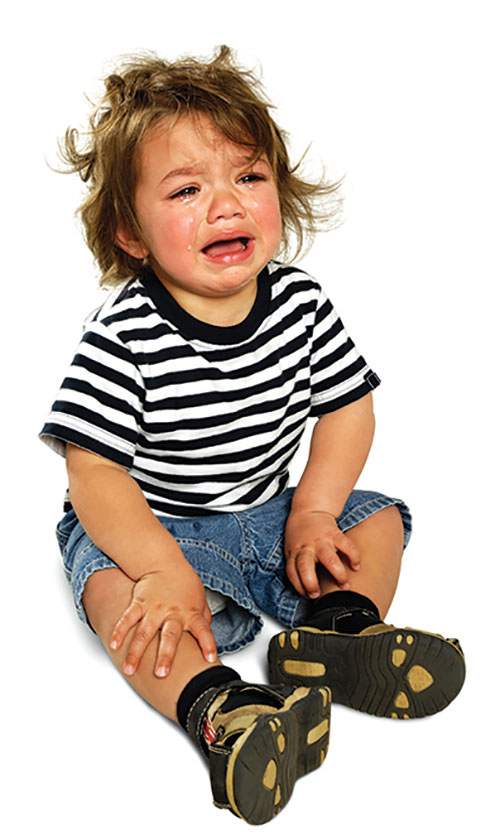
Scene: At the grocery check-out counter with a 3 year-old.
Liam: Daddy, Daddy, that guy has a beard just like yours! (Liam lunges for the magazine rack.)
Dad: Liam, don’t touch the magazines. Sit down in the cart.
Liam: Wow, look at the cover. He has a beard just like you do! (Liam grabs and wrinkles the magazine.)
Dad (irate, voice raised to a bark): Sit down! Look what you’ve done! Now I have to buy it. When you ruin something in a store, you have to buy it. What did I tell you one second ago?
Liam (crying and yelling now): You're yelling, Daddy. You tell me not to yell. You are yelling! (Liam starts to flop around in the cart and knocks a candy display off the check-out counter.)
Dad: Now look what you’ve done! You are out of control. No video for you tonight, or dessert.
Have any of us not experienced some version of the scenario above with our child? Thinking ahead and planning for problems is not the way most parents prepare for a simple trip to the grocery store. But it sure does help.
Let’s focus on ways Liam’s dad might have averted his son’s tantrum or dealt with it deftly as soon as it was unleashed. It’s like the airplane oxygen-mask rule: Put on your own mask first so you can be in good enough shape to help others.
Let’s review a list of the errors that Dad made in this classic meltdown scene in a grocery store and imagine ourselves in his place. We all admitted we committed most of them at some point, right?
1. Easy-to-make error: Unrealistic expectations
Children want to explore interesting stimuli around them. The grocery store is a treasure trove of engaging visual, tactile and sensual delights.
Instead, practice the tool of: Preparation for challenging situations
It’s important to know what’s normal for your child’s age, stage and temperament. Three-year-olds are interested in everything around them and are driven to explore. You want to keep your child on the track you want, so you can avoid the natural slide to the dreaded track of grabbing, begging and “gimmies.”
The best way to keep a child from misbehaving at a store is to engage him in conversation and give him things to do. He can count the lemons, hold the bag and estimate their weight. Especially while waiting in line, he can get bored, so you can be ready with games like, “Hey, can you show me a letter L on this package?”, “You want to hold this tissue box for me?”, “I spy something green? Guess where?”
2. Easy-to-make error: Attention to undesirable behavior
All attention is rewarding, so Dad just rewarded the wrong behavior. By saying “stop it” and focusing on the magazine, he kept Liam focused on the object of his attention, which is already very engrossing (It’s glossy! George Clooney’s beard looks like Daddy’s! How cool would it be to look inside?.) The idea of “stop” is just not registering.
Instead, practice the tool of: Attention to desirable behaviors
Better that you keep a chatter going about how well your kid is staying in the cart without fidgeting than pay attention when he doesn’t. What else is your kid doing right? Pay attention to that. Are you checking your phone for texts or telling your child that you appreciate the way he’s handing you things to give the grocer?
3. Easy-to-make error: Missing a chance for early intervention
When Dad saw Liam initially lunging for the magazines, he might have engaged him in something incompatible with the focus on that fascinating target.
Instead, practice the skill of: Re-direction of attention
When your child becomes dangerously attracted to the stuff in a store, the goal should be to engage her in another activity. Since the array of attractive stimuli is everywhere at the grocery store, you have plenty of material for that game of “I Spy”!
4. Easy-to-make error: Talking and lecturing while angry
When Liam initially grabbed the magazine, Dad barked orders and scolded him. Liam is too young to comprehend Dad’s points about compliance product destruction. It’s easy for parents to fall into the trap of talking too much when their emotional buttons are pushed (and this situation would do that to most of us).
Instead, practice the parenting skill of: Engaging your own self-calming skills
From a brain-science perspective, your emotional brain is triggered and you are probably “flooding,” your heart rate soaring to well over a 100 beats a minute. In order to activate your best decision-making capacities, you must first quiet the neural circuits in your emotional system. Once calm, your neural circuits will give you the potential for good choices about how to manage an impending tantrum fiasco in a grocery store.
Your child just wrinkled a magazine. Now what? Considering the developmental phase of your child (he’s 3 years old!), the emotional stress for both of you (he’s sensitive to your scold!), and your emotional tolerance (I’m already at my wit’s end and my child knows it!). I vote for low goals.
Avoid making it worse, direct your cart so that your child can’t do more damage, accept the reassurance of the grocer (even though it might be insincere), and don’t talk until you know you are saying something benign or truly helpful.
5. Easy-to-make error: Pushing an upset into a tantrum
By scolding Liam in a harsh tone about matters that Liam couldn’t comprehend at that moment, Dad probably incited the next level of Liam’s emotional arousal, which included flopping around and pushing over the candy display. Sometimes when we try “to teach them a lesson” when they are too young or distressed (or both) to understand it, we are responsible for driving the child’s emotional storm into a full-blown tornado. Our embarrassment, anger and frustration in situations like these are understandable! But blaming toddlers for their normal behaviors certainly doesn’t help the situation.
Instead, practice the parenting skill of: Damage control when things are out of control
Tantrum management involves entering the zone of true damage control; in other words, we want merely avoid making things worse.
What should we do when we are in a situation like this one? Keep the kiddo safe while his erupting emotions subside and try to be as neutral as possible. Punishing or giving a Time Out isn’t appropriate. Not only will a toddler not learn from negative consequences in the middle of an emotional tirade, but this one was triggered by factors that are not his fault. What next? Pick up the candy, move your cart, and pay the grocer. Re-set and re-boot your own emotional temperature in the car so that you drive carefully and sing a song on the way home.
Self-control as a muscle
Self-control in a child is an important muscle to develop. Toddlers demonstrate it daily when they resist throwing food, stop their tricycle to avoid hitting another one and brush their teeth when they don’t want to. But from a brain maturation perspective, we now know from brain scans that the part of the brain in charge of impulse control is not fully mature until the mid–20s. As parents, we need to encourage, praise and challenge our kids to develop this muscle, but we also need to be realistic that it will take practice, practice and more practice.
Many parents believe that a high IQ is the best indicator of how successful their children will be at realizing ambitious goals. But research shows that to be truly successful in life, what your child really needs is good self-control. In fact, compared to IQ and SAT scores, self-control is twice as predictive of health, educational achievement and relationship stability in adulthood.
For the 3- to 7-year old, self-control issues come in all kinds of developmentally appropriate shapes and sizes. High-energy kids struggle with impulsivity and shy kids struggle with facing new experiences. Whether she’s freaking out about the swim class, or he’s throwing an epic tantrum over Cocoa Puffs in the grocery aisle, our young kids’ self-control gaps can translate into uncomfortable, stressful and sometimes embarrassing situations for parents.
Socialization of children involves providing them with external controls and gradually removing them as they develop self-control. Supporting self-management in children is a long and tedious process, embedded in parents’ own adult lives which are already crammed full of demands, responsibilities and emotionally trying challenges. Still, parental capacity for self-control is a necessary pre-existing condition for the agenda of building the child’s capacity to be successful at self-control. If we can’t control ourselves, how are children supposed to do so?
A trip to the grocer’s is life with a toddler
Even for those who know and practice good parenting skills regularly, disasters happen. Being skillful on every single trip to the grocer’s — or any other day — is unrealistic. We need to remember that even if we slip and yell at a child for normal behavior, we can apologize. We can practice the tool of “acceptance,” which includes regular acceptance of ourselves and our child for doing the best we can, even though we want to do better.
Our goal is not to vanquish negative moments, tantrums or emotions. Our goal is to minimize the percentage of them that happen due to our own preventable actions or misguided expectations. It is also to manage them effectively. And when meltdowns happen, we just try to manage them the best we can. After they subside, we hope to breathe deeply and re-boot to a good-natured acceptance that practicing self-control skills are a lifetime pursuit.












